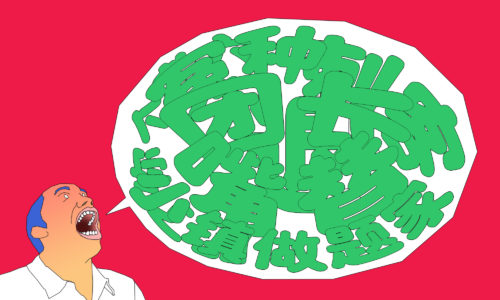Oily, beat a call, Laotie: China’s hottest internet slang from 2017

China has chosen its 10 most commonly used online slang words of the year, as People’s Daily reports, noting that “the popular words and phrases are the best linguistic representations of China’s current cyber culture.” Among the words, as selected by China’s National Language Resource Monitoring and Research Center:
打call (dǎ): Beat a call
People’s Daily writes:
Originally derived from Japanese, the phrase “beat a call” refers to a cheering dance performed by “otaku,” or people obsessed with pop culture. Featuring enthusiastic jumping, clapping, and glow stick waving, “beat a call” has become the most popular internet slang in 2017, with Chinese netizens using it to show approval and support for people, things, or events.
Though the neologism isn’t yet familiar enough to be used in the mainstream media without glossing, it’s getting there, with several major outlets in China using the word in their news reports. In October, Xinhua released an article regarding the 19th National Congress of the Communist Party of China, in which it called for the public to “beat a call” for Xi Jinping Thought on Socialism with Chinese Characteristics for a New Era.
扎心了,老铁 (zhā xīnle, Lǎotiě): My heart was pricked, Laotie
“Laotie” refers to one’s mate in northern China, so this phrase is used — originally in streaming websites — to tell a close friend he or she has hurt one’s feelings.
油腻 (yóunì): oily
Not just an adjective for food, “oily” is now used to describe fat, slovenly, repulsive middle-aged men. People’s Daily explains:
The term emerged as a comedic insult, and like many of its kinds, an initially vulgar epithet became a self-ascribed identity, in a classic example of a group of middle-class youngsters who has no time for their personal life and care claiming the once derogatory term as their own.
Elsewhere in Society and Culture:
Lesbian couple allegedly beaten up in Shanghai restaurant [UPDATE]
EARLIER THIS WEEK:
Concluding a case that garnered widespread attention on Chinese social media, Chen Shifeng, who stabbed his ex-girlfriend’s roommate to death in Tokyo last year, received a sentence that left many unsatisfied.
The university responded promptly to the public airing of the accusations by female students. In a recent Peking University survey reported on by The China Project, 35 percent of students at China’s colleges and universities said they had experienced gender-based discrimination or sexual violence.
Search giant Baidu released its annual report on major news, events, and people, which included a section titled “Top 10 society events” for 2017. Many involved scandals and crimes, such as recent kindergarten child abuse allegations and the disappearance of a young visiting scholar in Illinois.
A sobering statistic: China has 5 million blind people, but less than 200 of them have seeing-eye dogs. The high cost of training guide dogs ($30,000) and complicated transportation pose hurdles to getting more of the canines out to those who need them.
Baidu’s 2017 report also includes a list of the most-searched terms in the news. In addition to the predictable top stories (19th Party Congress, Trump, Belt and Road Initiative), the list includes a Ping-Pong coaching controversy and new customs regulations.
- Stranger than fiction
China’s real-life magic realism of 2017, according to Chinese netizens / Quartz - Population problems
China must relax birth controls to defuse population time bomb, top think tank warns / SCMP - Winter Olympics
Can Russia help China crack ice hockey? / Financial Times (paywall) - Traditional holidays
Winter solstice in China is a time for family, harmony and lavish meals / SCMP - Government grinch
No Santa, no reindeer, no mistletoe – Party members banned from celebrating Christmas / What’s on Weibo - Gaming
99 percent of Battlegrounds cheats are from China, PlayerUnknown says / Kotaku - Extraterrestrials
Is anyone out there? The days when UFO fever gripped China / SCMP






